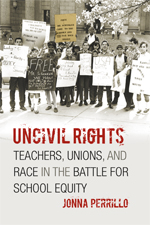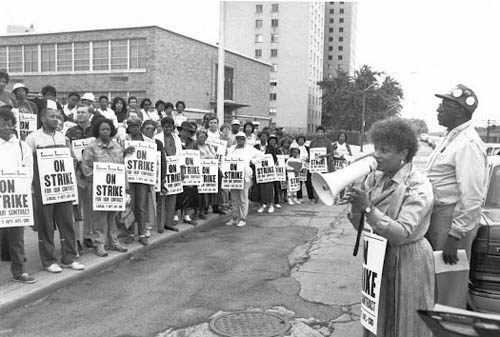Uncivil Rights: Teachers, Unions, and Race in the Battle for School Equity
 Walk into a low-income, minority school today, and you are likely to see halls plastered with the same optimistic slogans that have come to serve as fixtures in most American public schools. Walk into a classroom, however, and you are likely to see two unique realities that undermine those clichés: students mechanically preparing for standardized tests and teachers “teaching” from mandated instructional packages, otherwise known as scripted curricula. Written by private corporations that also serve as powerful lobbyists for school reform policy, these “teacher-proof” plans prescribe not just the content of a given lesson but every sentence that teachers will read off to their students in the course of a class. Accounts of teachers’ work with these curricula run from the ridiculous (the scripts allotting no time for teachers to repeat themselves) to the perverse (the common technique of call-and-response drills, a system of militaristic hand signals that accompanies one such program). In the words of Robert Slavin, creator of the Success for All Foundation, a supplier of premade curricula, scripted lessons promise not to “leave very much to chance” and instead offer a “relentless” approach to ensure productive activities “down to the level of minute-by-minute in the classroom.” The prevalent use of scripted curricula in many urban districts nationwide suggests that because poor children come to school less prepared than middle-class children, they must sacrifice discovery and innovation for efficiency, regimentation, and routine. For teachers, districts’ adoption of such curricula has produced unique professional and ethical challenges. Teaching from scripted lessons is like working in an “intellectual straightjacket,” explained one teacher. “I know that teaching Success for All is a charade,” confessed another, but “if I don’t do it I won’t be permitted to teach these children.” In a situation in which the educators who teach the most disadvantaged children possess the least opportunity to design creative and intellectually rewarding classrooms, students’ and teachers’ rights alike have been sacrificed.
Walk into a low-income, minority school today, and you are likely to see halls plastered with the same optimistic slogans that have come to serve as fixtures in most American public schools. Walk into a classroom, however, and you are likely to see two unique realities that undermine those clichés: students mechanically preparing for standardized tests and teachers “teaching” from mandated instructional packages, otherwise known as scripted curricula. Written by private corporations that also serve as powerful lobbyists for school reform policy, these “teacher-proof” plans prescribe not just the content of a given lesson but every sentence that teachers will read off to their students in the course of a class. Accounts of teachers’ work with these curricula run from the ridiculous (the scripts allotting no time for teachers to repeat themselves) to the perverse (the common technique of call-and-response drills, a system of militaristic hand signals that accompanies one such program). In the words of Robert Slavin, creator of the Success for All Foundation, a supplier of premade curricula, scripted lessons promise not to “leave very much to chance” and instead offer a “relentless” approach to ensure productive activities “down to the level of minute-by-minute in the classroom.” The prevalent use of scripted curricula in many urban districts nationwide suggests that because poor children come to school less prepared than middle-class children, they must sacrifice discovery and innovation for efficiency, regimentation, and routine. For teachers, districts’ adoption of such curricula has produced unique professional and ethical challenges. Teaching from scripted lessons is like working in an “intellectual straightjacket,” explained one teacher. “I know that teaching Success for All is a charade,” confessed another, but “if I don’t do it I won’t be permitted to teach these children.” In a situation in which the educators who teach the most disadvantaged children possess the least opportunity to design creative and intellectually rewarding classrooms, students’ and teachers’ rights alike have been sacrificed.
Today, teachers in the precarious position of needing to win back the professional “right” to control their work more than ever before. How did they arrive in this position? Eighty years ago, in the midst of the Great Depression, the concept of teachers’ rights reflected academic freedom issues and bread-and-butter concerns, particularly salary, tenure, and promotion. That concept grew more complex as midcentury teacher unionists linked professional rights campaigns to new sets of issues, including job assignments, the right to discipline students as they saw fit, and the right to teach without parental interference. Inextricable from larger conversations about racial discrimination and civil rights, these later understandings of teachers’ rights linked students’ welfare and teachers’ interests in broad yet often incompatible ways. Parents, education activists, and community organizations became the targets of these campaigns as much as education administrators, leaving unionized teachers an isolated if nevertheless sizeable interest group. Today, we have entered a new era in a story of teachers’ rights. For many educators, current mandates that require them to focus on test preparation and use prepackaged curricula ensure that their students receive a second-class education and leave teachers as the disseminators of it. In addition to the negative impact this system has had on students, then, are the complex questions it poses to the profession: Does designing one’s own curriculum or determining the course content in one’s classroom constitute a professional right? Are teachers’ rights violated when they are mandated to treat students in ways they find unethical? What is the role of teacher unions in improving teacher quality? And to what degree toes it make sense to frame professional decisions and performance in terms of a discourse of rights?
. . . .
The Teachers Union recognized these institutional shortcomings as well, although it projected more faith in individual teachers to overcome them. Teacher Unionists committed themselves to protesting widespread forms of economic discrimination, and they believed that teachers could make a significant difference in the quality of children’s lives until society changed. Their ability to ally themselves with the oppressed communities they served offers an important example of how liberal whites and blacks worked collaboratively to reform schools. One of the most affecting themes in minority parents’ accounts of their work with the Teachers Union was the way in which Unionist teachers taught them “what can happen when teachers voice their protests, when they don’t just stay for two terms.” To many black parents, teacher accountability and teacher quality were inextricable from working conditions that promoted professional commitment, including teachers’ freedom to comment and dissent.
These two models of teacher unionism are all the more important to revisit now in a political and educational climate that appears to hold little faith either in schools as public institutions or in the individuals who teach in them. One of the lesser recognized effects of this lack of faith is the way in which it has curtailed teachers’ ability to dissent from practices and philosophies they find unproductive, unethical, and unprofessional. Former Minnesota Federation of Teachers president Louise Sundin has compellingly explained how the No Child Left Behind Act has set teacher unions back. “We spent 20 years trying to professionalize teachers,” she has argued, “and now we’re getting thrown back into the industrial model, because it’s top down, it’s organized around hierarchy, and it’s line supervisor oriented. You do the curriculum this way because that’s the way we’ve decided it’s going to be better.”
—an excerpt from Jonna Perrillo’s Uncivil Rights: Teachers, Unions, and Race in the Battle for School Equity (2012)
 Chicago Teachers Union President Jacqueline Vaughn addresses striking teachers and unionized educational workers at a Chicago housing project, during the CTU’s 19-day strike in 1987.
Chicago Teachers Union President Jacqueline Vaughn addresses striking teachers and unionized educational workers at a Chicago housing project, during the CTU’s 19-day strike in 1987.